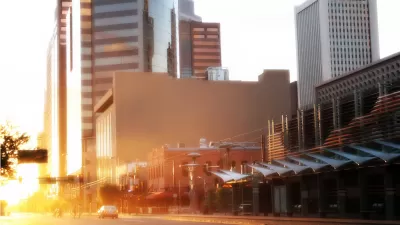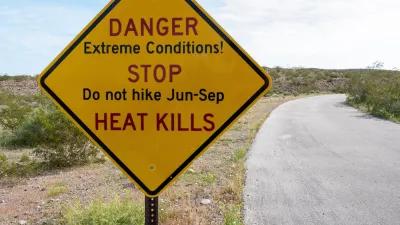As more extreme temperatures lead to an alarming rise in heat-related deaths across the country, Phoenix is taking action with the nation's first public heat response office.

As one of the nation's fastest-warming cities, Phoenix has seen a sharp rise in heat-related deaths as extreme temperatures become more commonplace. To address this growing public health crisis, the city has created the first publicly funded Office of Heat Response and Mitigation to tackle the problem of extreme heat and prevent heat deaths, which reached almost 500 in 2020. Jessica Kutz spoke with David Hondula, the director of the new office, to get a sense of how the city plans to develop a more comprehensive heat mitigation policy.
Hondula says the department will focus on coordinating a variety of short- and long-term heat mitigation strategies with other city departments and prioritizing cooling methods that meet local needs, such as increasing the city's tree canopy, installing cool pavement, and opening cooling centers for residents with no access to safe spaces in the extreme heat.
Hondula acknowledged the unequal heat burden faced by low-income communities, saying that his office will "steer the city’s investments in mitigation and response to the communities where there is the greatest need."
Earlier this year, Phoenix pledged to commit to 'tree equity' by 2030 by planting more trees in underserved neighborhoods and closing the green gap between high-income and low-income communities, where lack of shade exacerbates the effects of extreme heat.
FULL STORY: How to cool one of the fastest-warming cities in the West

Maui's Vacation Rental Debate Turns Ugly
Verbal attacks, misinformation campaigns and fistfights plague a high-stakes debate to convert thousands of vacation rentals into long-term housing.

Planetizen Federal Action Tracker
A weekly monitor of how Trump’s orders and actions are impacting planners and planning in America.

San Francisco Suspends Traffic Calming Amidst Record Deaths
Citing “a challenging fiscal landscape,” the city will cease the program on the heels of 42 traffic deaths, including 24 pedestrians.

Detroit Says Problems With Property Tax Assessments are Fixed. Advocates Disagree.
With higher-valued properties under assessed and lower-valued properties over assessed, advocates say there's still a problem with Detroit's property tax system.

Defunct Pittsburgh Power Plant to Become Residential Tower
A decommissioned steam heat plant will be redeveloped into almost 100 affordable housing units.

Trump Prompts Restructuring of Transportation Research Board in “Unprecedented Overreach”
The TRB has eliminated more than half of its committees including those focused on climate, equity, and cities.
Urban Design for Planners 1: Software Tools
This six-course series explores essential urban design concepts using open source software and equips planners with the tools they need to participate fully in the urban design process.
Planning for Universal Design
Learn the tools for implementing Universal Design in planning regulations.
Heyer Gruel & Associates PA
JM Goldson LLC
Custer County Colorado
City of Camden Redevelopment Agency
City of Astoria
Transportation Research & Education Center (TREC) at Portland State University
Jefferson Parish Government
Camden Redevelopment Agency
City of Claremont





























